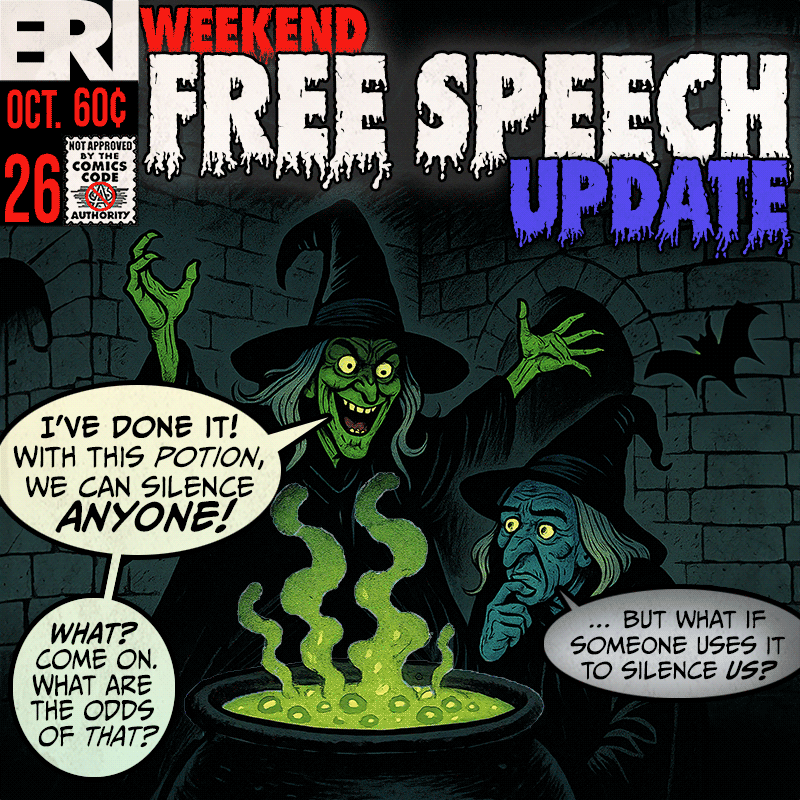Mchangama on who has free speech, Indiana University censors a student paper, why Marco Rubio is wrong, & more!
Bringing you the latest free speech news (10/26/25)
Stories of the week
Who Has Free Speech? (Foreign Affairs) by Jacob Mchangama
Many contemporary Americans have come to believe—with some justification—that the liberal-progressive tradition abandoned free speech, enforcing ideological conformity in elite universities, the media, and cultural institutions. That retreat made it easier for Trump to weaponize free speech as a rallying cry against cancel culture even as he moved to suppress dissent. When free-speech restrictions are deemed legitimate only if imposed by the “right” people against the “wrong” ones, then free speech indeed becomes an artificial concept, malleable in the hands of whoever holds power. Civil libertarians such as Marshall, Aryeh Neier (a former executive director of the American Civil Liberties Union), and Congresswoman Eleanor Holmes Norton have cautioned that this view of free speech is a dangerous gamble: the tools used to suppress hate today can be turned against protest, satire, or dissent tomorrow. Their warnings were prophetic.
In April 2024, faculty launched a petition calling for a vote of “no confidence” in the university’s leadership. They cited encroachments on academic freedom and shared governance, highlighting examples that raised concerns about viewpoint discrimination. These included the university’s suspension of associate professor Abdulkader Sinno from his advising role after he publicly criticized the university for denying a room reservation to the Palestine Solidarity Committee, a student group he advised, as well as its cancellation of an art exhibit and talk featuring Palestinian artist Samia Halaby at its campus museum.
This week in Expression
When members of the Ashland County Democratic Party set up a booth at their local fair last month, they might have expected a few political disagreements. What they surely didn’t expect was to be expelled from the fairgrounds and reported to the Secret Service over buttons expressing opposition to President Donald Trump. Now, they’re suing the officials who trampled their First Amendment rights.
How ‘anti-woke’ laws and cancel culture combine to chill classroom speech by Michael Hurley
Thurgood Marshall: America’s premier First Amendment defender by David L. Hudson
High-profile comedians paid handsomely to not offend Saudi royals at Riyadh comedy fest by Sarah McLaughlin
Why Marco Rubio’s arguments for deporting noncitizens for speech are wrong by Angel Eduardo
The idea, from our nation’s founding, is to protect the “inalienable” right to free expression. Our Founders did not believe that free speech was a privilege granted to us by our government, but rather a right inherent to us all, which required protection from government. And there is no historical merit to the idea, forwarded by some, that these rights were only ever intended for American citizens. In fact, many of the most prominent and controversial voices during our nation’s founding were noncitizens.
This week in FIRE’s blog
The Supreme Court should strike down Colorado’s ban on ‘conversion therapy.’ Here’s why by Will Creeley
Talk therapy is speech. And when the government prohibits speech because it doesn’t like the views being expressed, it violates the First Amendment.
FIRE in the press!
London Calling: Ronnie’s First Amendment Roundup
First Circuit affirms dismissal of Title VI and KKK Act claims that university failed to adequately curtail anti-Israel and pro-Palestinian student protests
The U.S. Court of Appeals for the First Circuit affirmed a Massachusetts federal court decision dismissing claims by a group dedicated to combatting antisemitism and two MIT students that the school failed to properly address the 2023-2024 anti-Israel and pro-Palestinian campus protests that plaintiffs characterized as subjecting Jewish and Israeli students to antisemitic harassment. Specifically, they alleged MIT was deliberately indifferent to severe, pervasive, and objectively offensive harassment that caused deprivation of educational opportunities or benefits in violation of protections against racial discrimination in Title VI of the Civil Rights Act, and that MIT knowingly failed to prevent a conspiracy by protestors to deprive Jewish and Israeli students of civil rights in violation of the Ku Klux Klan Act. But the Court of Appeals held the plaintiffs failed to allege actionable racial harassment for three core reasons. First, most of the conduct complained of was speech the First Amendment protects, and the court would not construe Title VI as requiring a university to quash protected speech. Next, the court held that protestors’ gathering together in groups on campus, disrupting tranquility, and impeding travel for many students did not render their speech antisemitic, much less unprotected. Third, to the extent plaintiffs identified isolated incidents that were arguably antisemitic, their allegations did not establish that those were sufficiently severe, pervasive, and offensive to be actionable Title VI harassment. The court also held plaintiffs did not sufficiently allege MIT’s indifference by claiming it “dragged its feet,” “took only minimal action,” and “failed to discipline” student protestors to deter their conduct, given the university’s attempts to avoid escalation and violence through progressively evolving responses. And under the Ku Klux Klan Act, the court cited failure to plead that the protestors conspired “for the very purpose” of depriving plaintiffs of either constitutional rights to be free from racial violence, contractual rights, or property rights, as the Act requires.
Bonus case: The D.C. Circuit has denied an FTC request to stay pending appeal the preliminary injunction entered in Media Matters for America v. FTC against a burdensome and intrusive civil investigative demand, noting that: “While the starting presumption is that agency actions are taken in good faith, … the Commission has not shown that the unique—and seemingly quite unprecedented—constellation of undisputed facts and circumstances … render erroneous the district court’s tentative finding that Media Matters’ protected speech likely caused issuance of” the CID, which the district court had said “presents a straightforward First Amendment violation.” As was echoed in FIRE’s amicus brief supporting Media Matters’ D.C. Circuit opposition to the FTC’s stay motion.
International free speech stories of the week
Spanish priest acquitted after facing 3 years behind bars for criticizing radical Islam (Fox News) by Rachel del Guidice
No more investigations into ‘non-crime hate incidents’ after Linehan case, Met Police says (Sky News)
Posting on X, Linehan announced : “After a successful hearing to get my bail conditions lifted (one which the police officer in charge of the case didn’t even bother to attend) the Crown Prosecution Service has dropped the case.
“With the aid of the Free Speech Union, I still aim to hold the police accountable for what is only the latest attempt to silence and suppress gender critical voices on behalf of dangerous and disturbed men.”
Karnataka govt will be bringing law to curb misinformation: Siddaramaiah (Siasat Daily)
Controversial playwright speaks out after cancellation of gay-themed play starring Antony Wong (MyNews) by Enid Tsui
Kids’ movie of the week
John Malkovich’s portrayal of Dave the octopus in Penguins of Madagascar is one the greatest and least appreciated super villains in cartoon movie history. There, I said it.





I understand the Free Speech and the writer position on Marco Rubio. However he forgets to mention that “from the river to the sea” and other taglines were 99% accompanied by “kill the Jews”, “October 7 we will do 10,000 times again”. And then how is that ok …
Greg, you have a terminal case of TDS. In every of your posts. What a pity, do you have one ally? Woke University administrations cannot stand you. The only people that could provide correction is Trump administration, yet you are too left-elitist to recognize it. So, keep posting your screeds.
A year ago I was tempted to donate to FIRE. Now I see that it is overrun by an activist (you), and is self-defeating. O well, what else is new in activist realm...